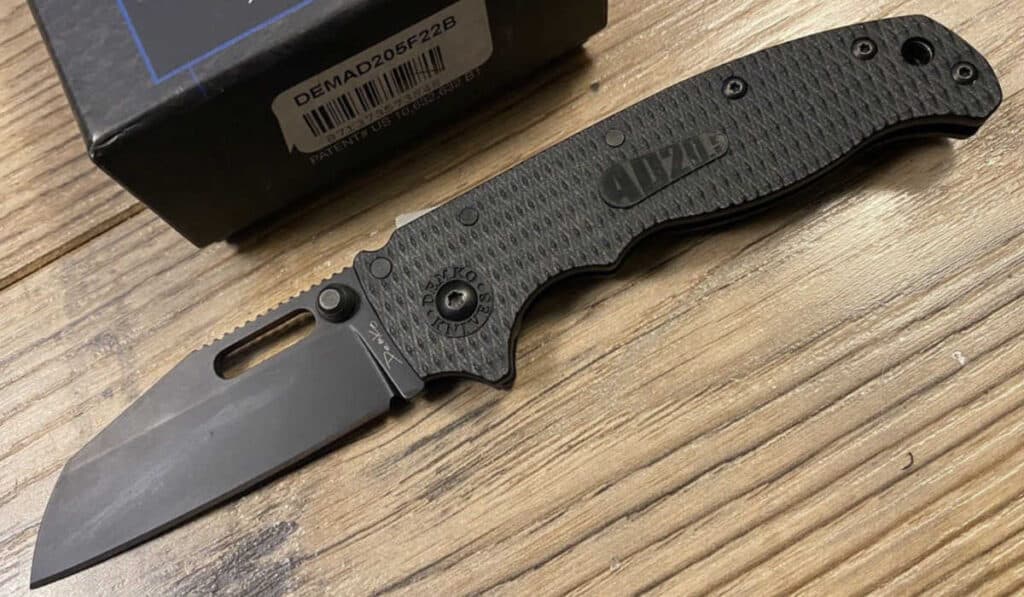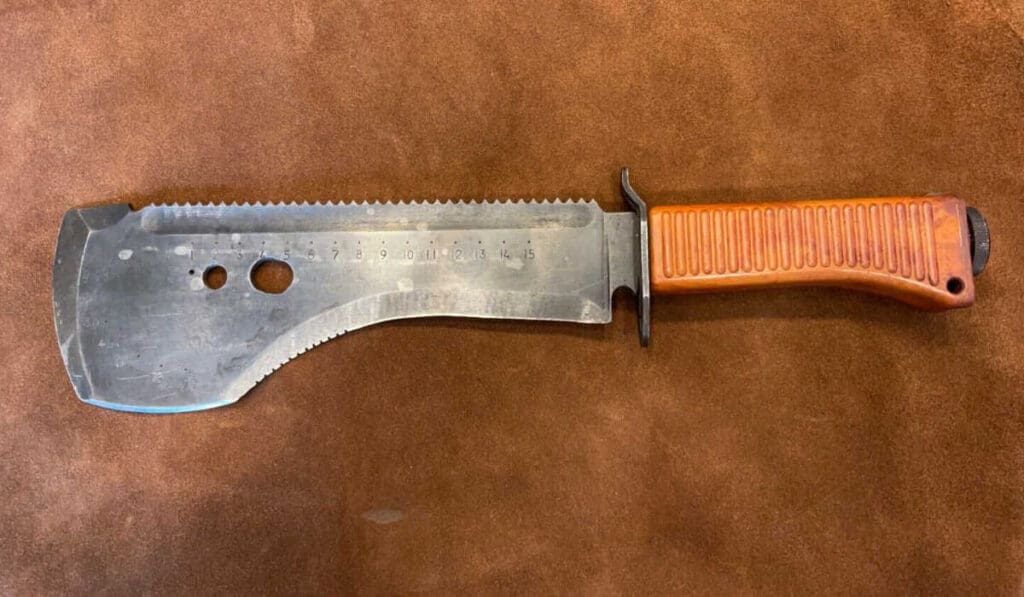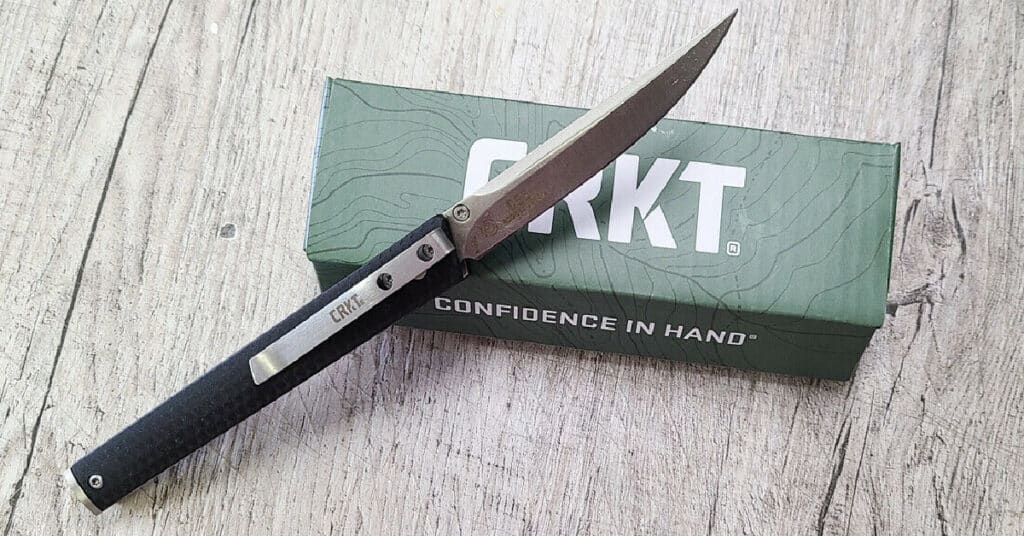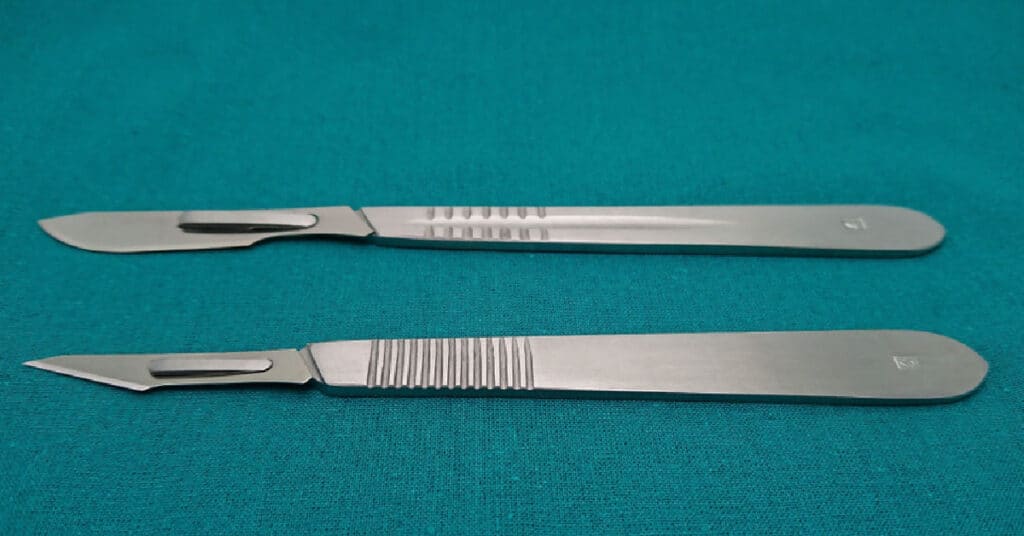As an Amazon Associate I earn from qualifying purchases.
Gravity knives have been a subject of controversy and intrigue for many years, primarily due to their unique opening mechanism and their association with criminal activities. These knives contain a blade concealed within the handle, which can be opened by the force of gravity, allowing for easy one-handed operation. While they may seem like a practical and convenient tool to have, their legal status is often called into question.
In order to understand the reasons behind gravity knives’ illegality, it is essential to delve into their history and the concerns surrounding their use. Originally designed for German paratroopers during World War II, gravity knives quickly gained a reputation for being efficient and easily accessible in high-pressure situations. However, as they became more available in the consumer market, they started to raise safety and legal issues due to their potential use as weapons and their ability to be easily concealed.
The debate over gravity knives continues to persist, with some arguing that these tools are essential for certain occupations or situations, while others maintain that their risks and potential for criminal usage far outweigh their practicality. The ongoing discussion highlights the complexity of the issue and the importance of addressing the balance between utility and public safety.
Understanding Gravity Knives
Mechanism
Gravity knives use a unique mechanism that allows their blades to be opened and locked into place with the force of gravity. Unlike some folding knives, gravity knives don’t rely on springs, assisted opening, or thumb studs to deploy the blades. Instead, they require the user to simply use a flick of the wrist or another similar motion to extend and secure the blade.
Pivot
At the heart of a gravity knife is its pivot mechanism, which connects the blade to the handle. This pivot plays a crucial role in allowing the knife to open and close smoothly. When the user moves the knife in a specific way, the pivot allows the blade to swing out and lock in an open position, ready for use.
Centrifugal Force
Centrifugal force is the outward force that is experienced when an object is rotated around an axis. In the case of gravity knives, this force is what allows the blade to swing open and lock in place when the knife is manipulated. By applying the right amount of motion and force, users can effectively deploy the blade with a simple flick of the wrist.
Inertia
Inertia is the tendency of an object to resist changes in its state of motion. When applied to gravity knives, inertia comes into play as the user flicks the knife to open the blade. The force applied to the handle causes the heavier blade to resist the motion, and it remains in its closed position until the correct amount of acceleration is provided to overcome that inertia. Once the blade starts moving, its own inertia helps to swing it into its open and locked position.
Force of Gravity
The force of gravity is another essential aspect of gravity knife operation. As the user flicks their wrist and gives momentum to the knife’s handle, gravity acts on the pivot and blade, assisting in the opening process. This combination of forces makes the gravity knife easy to open with one hand, allowing users to maintain their grip on the handle securely throughout the process.
By understanding the various components and forces involved in the operation of gravity knives, it becomes clear how they differ from other types of folding knives. The unique mechanism and application of forces like centrifugal force, inertia, and gravity make gravity knives efficient and easy to use, but they can also pose safety risks and contribute to their illegality in some regions.
Are Gravity Knives Legal In Your State? Yes/No
(Do note that laws change so be sure to double-check as I can only update things so fast)
Alabama: Yes. Alabama doesn’t restrict the possession or carry of gravity knives.
Alaska: Yes. No restrictions on gravity knives in Alaska.
Arizona: Yes. Arizona has no restrictions on owning or carrying gravity knives.
Arkansas: Yes. Arkansas law doesn’t restrict gravity knives.
California: Yes, with restrictions. California law stipulates that any knife concealed carried must not exceed 2 inches in blade length.
Colorado: Yes. Gravity knives are not specifically restricted in Colorado.
Connecticut: Yes, with restrictions. Knives with blades that are longer than 1.5 inches may not be carried outside the home or place of business.
Delaware: No. Gravity knives are illegal to own or carry.
Florida: Yes. No specific restrictions on gravity knives.
Georgia: Yes. Georgia doesn’t have restrictions on gravity knives.
Hawaii: No. Gravity knives are not legal in Hawaii.
Idaho: Yes. No specific laws against gravity knives.
Illinois: Yes, with restrictions. Must have a Firearm Owner’s Identification Card.
Indiana: Yes. Indiana law doesn’t restrict gravity knives.
Iowa: Yes. Iowa does not have any specific restrictions on gravity knives.
Kansas: Yes. No restrictions on gravity knives.
Kentucky: Yes. No specific restrictions on gravity knives.
Louisiana: Yes. Gravity knives are not specifically restricted.
Maine: Yes. Gravity knives are not specifically restricted.
Maryland: Yes, with restrictions. Maryland does not ban the possession of gravity knives, but concealed carry may be illegal.
Massachusetts: No. Gravity knives are illegal in Massachusetts.
Michigan: Yes. No specific laws against gravity knives.
Minnesota: Yes. No restrictions on gravity knives.
Mississippi: Yes. Mississippi law doesn’t restrict gravity knives.
Missouri: Yes. Gravity knives are not specifically restricted in Missouri.
Montana: Yes. Montana law doesn’t restrict gravity knives.
Nebraska: Yes. Nebraska law doesn’t restrict gravity knives.
Nevada: Yes. No restrictions on gravity knives.
New Hampshire: Yes. No restrictions on gravity knives.
New Jersey: No. Gravity knives are illegal in New Jersey.
New Mexico: Yes. No restrictions on gravity knives.
New York: Yes, but controversial. New York State repealed its ban on gravity knives in 2019, but New York City has historically enforced this law aggressively.
North Carolina: Yes. No restrictions on gravity knives.
North Dakota: Yes. No restrictions on gravity knives.
Ohio: Yes. Ohio law doesn’t restrict gravity knives.
Oklahoma: Yes. Gravity knives are not specifically restricted.
Oregon: Yes. Oregon law doesn’t restrict gravity knives.
Pennsylvania: No. Gravity knives are illegal in Pennsylvania.
Rhode Island: Yes, with restrictions. Carrying of a concealed gravity knife is illegal.
South Carolina: Yes. South Carolina law doesn’t restrict gravity knives.
South Dakota: Yes. No restrictions on gravity knives.
Tennessee: Yes. Tennessee law doesn’t restrict gravity knives.
Texas: Yes. Texas law doesn’t restrict gravity knives.
Utah: Yes. No specific restrictions on gravity knives.
Vermont: Yes. No specific laws against gravity knives.
Virginia: Yes, with restrictions. Carrying of a concealed gravity knife is illegal.
Washington: Yes, with restrictions. Carrying of a concealed gravity knife is illegal.
West Virginia: Yes, with restrictions. Carrying of a concealed gravity knife is illegal.
Wisconsin: Yes. Wisconsin law doesn’t restrict gravity knives.
Wyoming: Yes. No specific restrictions on gravity knives.
➡️ Visit Our State Knife Law Directory
Origins and Popularity of Gravity Knives
WWII
Gravity knives emerged in the spotlight during World War II, serving various purposes. Their ease of use and quick deployment made them popular among soldiers and parachutists. The design allowed for one-handed operation, a significant advantage in combat situations where time and mobility were critical factors.
Luftwaffe
The German Luftwaffe, or air force, had an especially notable gravity knife: the Fallschirmjäger-Messer. This knife was designed and issued to their paratroopers as a versatile tool capable of cutting through ropes, straps, and other materials during airdrops.
Stagehands
Gravity knives also gained popularity outside of the military context. Stagehands, for example, found the tool to be particularly useful for their line of work. The compact design and swift access to the blade made it a practical addition to their everyday tools, enabling them to cut ropes and fabrics easily.
Tradespeople’s Knives
Many workers from various trades discovered the convenience of gravity knives and started using them in their professions. The knives’ quick-opening mechanism was well-suited to situations where a sharp blade was needed at a moment’s notice, such as construction sites or repair jobs.
Manufacturers
Several manufacturers capitalized on the growing popularity of gravity knives, producing a diverse range of designs and styles. With increased demand from different professional fields, these knives’ production flourished throughout the decades following WWII. Despite this popularity, however, gravity knives eventually garnered negative attention due to their potential for misuse and association with criminal activities. As a result, they were made illegal in many jurisdictions.
Legal Aspects of Gravity Knives
New York Laws
Gravity knives were outlawed in New York since 1958, originally targeting the Luftwaffe gravity knife, a Nazi-era weapon. The strict enforcement of these laws led to thousands of arrests, many resulting in questionable convictions due to the imprecise definition of a gravity knife.
Federal District Court
In the past, cases involving gravity knives were handled in New York’s Federal District Court. Prosecutors commonly used the possession of a gravity knife as sufficient cause to charge individuals with crimes related to carrying a deadly weapon.
Unconstitutional Rulings
The Legal Aid Society, an organization providing legal support for low-income individuals, advocated heavily against the gravity knife laws in New York. They argued that the laws were unconstitutional due to their vagueness and potential for unfair treatment of those charged with carrying a gravity knife.
Legal Definition
One of the primary issues with the New York gravity knife laws was the vague legal definition of a gravity knife. Pressure from advocacy groups eventually led to reforms, which provided clearer guidelines for identifying gravity knives. These revised laws now differentiate gravity knives from other folding knives that can be opened by the flick of a wrist, which was previously the key determinant in defining a gravity knife.
Vagueness
The vagueness of the original gravity knife laws enabled law enforcement officers to make arbitrary arrests based on their interpretation of the law. This created a situation where individuals could be charged for carrying a common folding knife, even if it was never intended to be used as a weapon. The revised laws today help to provide more clarity and reduce the likelihood of such situations occurring.
Comparison to Other Knives
Gravity knives are often compared to other types of knives due to their similar function and appearance. In this section, we will examine the differences and similarities between gravity knives and other common types of knives, such as switchblades, OTF automatics, side openers, and pocket knives.
Switchblades
Switchblades, like gravity knives, are folding knives with a blade that can be quickly deployed. The main difference between the two is the mechanism used to open the blade. Switchblades use a spring-loaded mechanism that is activated by pushing a button or switch on the handle. This makes them easy to open with one hand, but has also led to them being highly regulated in many areas due to their potential for misuse as a weapon. In comparison, gravity knives rely on the force of gravity and a flick of the wrist to open and lock the blade in place.
OTF Automatic
OTF (Out The Front) automatic knives are another type of knife that closely resembles gravity knives. These knives have a blade that slides out of the front of the handle, rather than folding out like a switchblade or gravity knife. Like switchblades, they also use a spring-loaded mechanism, often activated by a button or switch on the handle. These knives share the same concerns as switchblades, with their quick deployment leading to them being regulated or illegal in some places.
Reforming Gravity Knife Laws

Advocates
Various advocates, including lawmakers and legal professionals, have been pushing for reforms in gravity knife laws, particularly in New York State. These efforts are primarily driven by concerns over the overcriminalization of gravity knife possession, which has historically led to numerous questionable arrests and disproportionately affected Black and Latino men.
The Legal Aid Society, a nonprofit organization that provides legal representation for low-income New Yorkers, has been a key player in advocating for the reform of these laws. They reported that 84 percent of their clients prosecuted for gravity knife possession between July 1, 2015, and Dec 31, 2015, were Black and Latino men.
Legality
In recent years, there have been significant efforts to adjust the legal status of gravity knives and provide clearer definitions. One critical development was the overturning of New York’s highly restrictive gravity knife law in 2019. The change in the law decriminalized the possession of gravity knives, leading to a reduction in the number of arrests linked to their use or concealment.
However, gravity knife regulations continue to vary across jurisdictions worldwide, with many still considering them illegal. The sometimes vague definition of a gravity knife, often determined by a “wrist flick test,” contributes to confusion surrounding their legality.
Federal district courts have also played a role in clarifying the interpretation of these laws. Concealed carry regulations for knives can differ significantly from one location to another, further complicating the issue for both knife users and law enforcement.
Conclusion
Gravity knives have been a topic of controversy due to their unique design that allows for quick and easy opening, often with just a flick of the wrist. This poses a significant risk, as the swift deployment of the blade can result in accidental injuries. The illegality of gravity knives is primarily driven by safety concerns and the potential for their misuse in criminal activities.
Though not all gravity knives are designed with malicious intent, their one-handed opening and closing capability makes them a convenient tool for various activities. However, the combination of these features with their potentially dangerous consequences has led lawmakers to categorize them as illegal in many jurisdictions.
It’s essential to be aware of the laws governing the possession, use, and sale of gravity knives within your region. Ensuring compliance with these regulations can help reduce the risks associated with these unique tools, while still allowing for safe and responsible usage.
Do Sheepsfoot Blades Have A Purpose? (Cuz They’re Ugly…)
Spetsnaz Machetes – Blades Of The Russian Special Forces
What Is The Actual Purpose Of A Spear Point Knife Blade?
CRKT CEO Review – Coolest, Most Worthless Knife Ever?
How Sharp Is A Scalpel? (Is It Sharper Than A Razor?)
Can You Shave With A Knife? (Yes, Here’s How)
As an Amazon Associate I earn from qualifying purchases.







